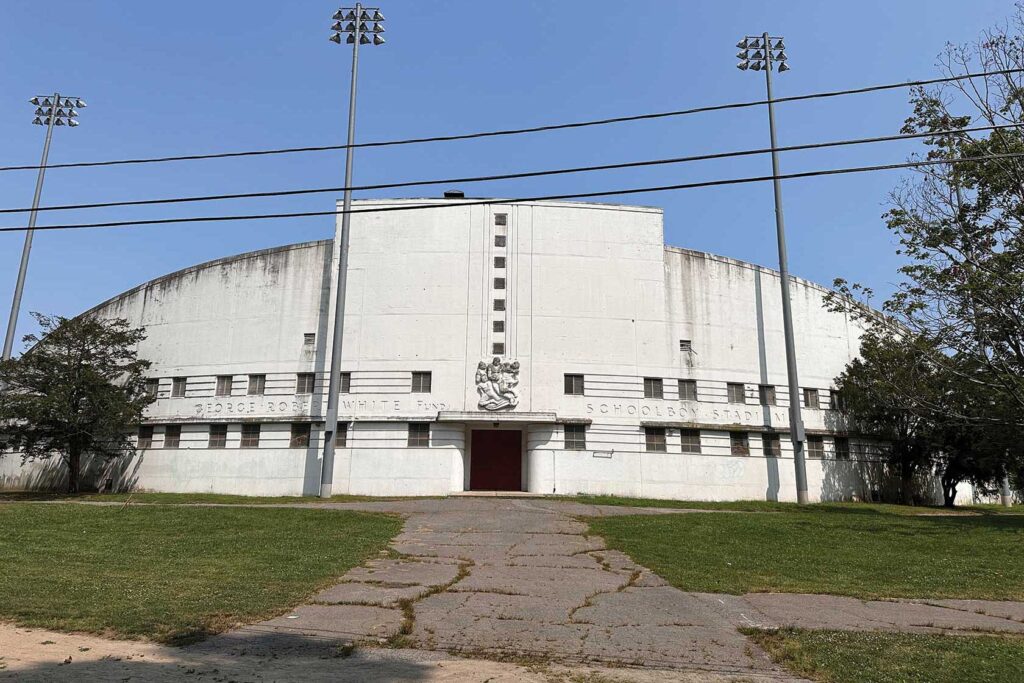
The Boston Parks and Recreation Commission approved last Monday Mayor Michelle Wu’s ambitious plan to renovate White Stadium, the rundown sports arena at the center of an ongoing controversy, into a larger sports facility. The new space would be used by Boston Public Schools and a professional women’s soccer team.
In a win for Wu and Boston Unity Soccer Partners, the owner of the professional women’s soccer team, the commission voted unanimously to allow the demolition of White Stadium which could potentially begin as soon as this fall.
For months, the proposed overhaul has divided Franklin Park area residents, with some showing support for the project and others raising concerns about the environmental impact, noise and transportation. An ongoing lawsuit against the refurbishment claims the project is not in the best interest of the community, citing the potential for reduced public access to the park.
In a statement, Wu said the project would “expand access for BPS students and the general public, add new public amenities, open up new green space to the park, and provide the resources to professionally manage and maintain the stadium.”
“This unanimous support from the Boston Parks Commission affirms the many months of community engagement that have shaped every aspect of the plan for White Stadium,” Wu said. “And we’re thrilled to move forward with delivering a state-of-the-art facility and generational investment in Franklin Park for Boston Public Schools students, neighborhood residents, and all those who love the park.”
The renovation plan previously received approval from the Landmarks Commission and the Boston Civic Design Commission. In July, the Boston Planning & Development Agency approved part of the redevelopment project.
The proposed plan would see the dilapidated 11,000-seat stadium being turned into a larger facility with upgraded amenities. The approximately $100 million renovation project includes replacing the bleacher seats in the west grandstand and adding wings, as well as additional spaces for community programming in the “grove” section of the stadium, according to plans outlined by BPDA.
Some Franklin Park advocates have said they are for the revamp of White Stadium for use by students and community members but have questioned the city’s plans to manage parking and the number of fans flowing in and out of the stadium on game days.
“Without any state environmental reviews, or answers to countless questions, the City of Boston is poised to tear down White Stadium in just a few weeks,” said Emerald Necklace Conservancy president Karen Mauney-Brodek in a statement. “If Massachusetts truly stands for environmental justice, we urge state officials to examine this deeply flawed plan, and step in before permanent damage is done to historic Franklin Park and our communities,” she continued.
Mauney-Brodek is part of the Franklin Park Defenders, the group of Franklin Park residents and the Emerald Necklace who filed the lawsuit against the project.
In March, a Suffolk County Superior Court judge rejected the plaintiffs’ request for a temporary injunction.
Renee Stacey Welch, a longtime Franklin Park resident and a member of the Franklin Park Defenders, said she was “hurt” but “not surprised” by the commission’s decision to approve the demolition.
Her primary concern regarding the rehabilitation of White Stadium, she said, is how the professional women’s soccer team’s use of the new enhanced arena could affect the quality of life of the area residents given the influx of foot and car traffic on game days.
She also questioned the reason for the development’s high price tag, saying a large portion of the $50 million the city will spend on upgrading White Stadium could be put towards funding public schools and sports programs.
“You don’t need luxury boxes that the majority of the people in this community can’t afford,” Welch said.
In a statement, Boston Unity Soccer Partners, which has agreed to cover the other roughly $50 million in capital costs, said the project would “preserve the legacy of White Stadium.”
“The Parks Commission’s unanimous approval of the demolition plan marks a key milestone in the process and brings us one step closer to moving forward with our vision to create a revitalized White Stadium that serves as a resource for the community and a venue that is worthy of our Boston Public Schools student-athletes,” the statement read.
While demolition is set to begin in the fall, it will not start until a lease is finalized and signed, a spokesperson for the city said.






